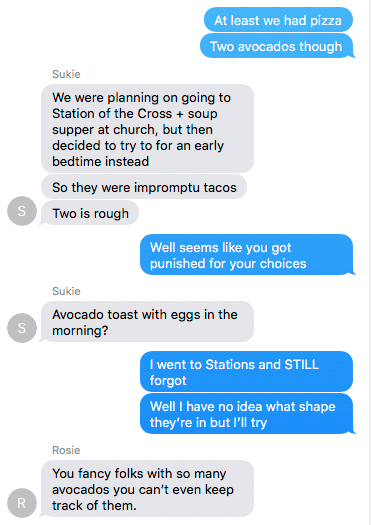{bits & pieces}
The weekly “little of this, little of that” feature here at Like Mother, Like Daughter!
(This will all look and work better if you click on the actual post and do not remain on the main page.)
I accidentally had a pretty nice breakfast today, due to this conversation last night:

Is the struggle not real?
They go on sale, you buy a certain quantity (in my case, three, which is wildly optimistic because there are three of us here and we don’t eat a ton of anything, and with avocados, you just can’t tell).
One of them gets deployed in a salad and is lovely, so the other two are deemed “just right” and get put in the fridge as a hedge against what you know will happen, which is that they will otherwise over-ripen.
But you know that if the fridge is too cold, they will become as unto tasteless sludge.
But you hope. And you try to make a mental note as to their presence there.
And they get moved around.
And then, they get found.

This morning:

Reader, it was appealing. (Yes, I did take a bite before I thought to take the pictures! And no, I don’t think I’ve ever had avocado toast before, in a stunning failure of cultural participation, and despite the fact that I just squeak under the Millennial wire, age-wise):



In even more wandering chitchat, my husband gave me that book for Christmas — part of the autobiography of Josef Pieper, a great favorite of mine. (It has a positively atrocious cover, chosen seemingly at random, for it is indeed a photo of an oil rig at sea — the image that certainly comes to my mind when I think of a kindly German scholar of Thomas Aquinas from the middle part of the last century, but whatever. It’s also not translated or edited very well. But I love him so.)
I had posted this excerpt on Facebook and thought I’d share it here too. He’s musing on the kind of life he himself chose — the simple life that doesn’t seek after honors or accolades from the public — and the death of his father:
The unusual modesty of his life style, for example, was, when you look back, nothing but the reverse side of his concern for the future of his sons and daughters. When he returned from a visit they made together to a colleague who maybe had a particularly nice house, he used to say to my mother comfortingly, “Our possessions are not dead things. They are alive.” After the death of my father the thought came to me with a new intensity, and perhaps for the first time, about what I may have meant to him, in terms of both joys and sorrows.
On to our links:
Deirdre’s husband, John Folley aka The Artist, has illustrated a book with his friend Matthew Mehan: Mr. Mehan’s Mildly Amusing Mythical Animals. This is a remarkable venture — it’s an alphabet book with rhymes and pictures very much in the tradition of Lewis Carroll and Edward Lear — “nonsense” that is grounded deep in the cultural memory. These two have put an incredible amount of work into this book — there are 50 illustrations — with 26 oil paintings of the highest quality — and a whimsical, thoughtful poem for each of the letters. There’s even a lullaby that’s really beautiful!
The creators are asking for pre-orders, which is basically a go-fund-me for a new classic in the making. So they realize that this is unusual, to ask for money before the product has been made. But the truth is that publishing today is a matter of conventional expectations; something different is hard to market unless popular demand can be demonstrated! So… :)



What causes young people to convert? The answer may surprise you.
The most remote parish on earth and the faith of the one woman at its heart.
Truth can sting. An essay about the less than honest representation of moral duty in Amoris Laetitia, Pope Francis’ apostolic exhortation that has been causing so much turmoil — with some personal notes, from Matthew Schmitz, editor of First Things. I wonder how many of us find ourselves in this situation:
I assumed that she knew my moral views, which I have enough trouble imposing on myself, let alone anyone else. So I thought it best to show my solidarity by listening to her without any trace of judgment. A word of warning might risk her anger, reveal that our friendship was weaker than we wanted it to be.
This article is about oral tradition in liturgy, but I think it has good insights about how we learn — and how children learn and become persons with a store of songs, poems, and other wise expressions in their minds but ready at any moment to burst forth in community life. In Pieper’s autobiography he mentions many times how he and an often new-found friend would find themselves reciting favorite poems to each other! This article suggests to us that we depend too much on the written word (although of course, things must be written down, and we must have rules about worship) and don’t commit enough to memory. As I was reading, I was thinking about how as a child — not a Christian child! — I did somehow know all the verses to many Christmas carols, for instance (I don’t really know them now). When the singing began, we all just sang — we didn’t resort to booklets. Same with patriotic songs. Perhaps this observation can help with priorities in the home school and enrich family life in general.
Fr. Schall “On Them Pearly Gates” — a Thomist looks at a Gospel hymn. “We have intimation here of Chesterton’s remark on the strangeness of our life on earth. It is that, especially if we live it well, we begin most poignantly to feel ‘homesick even at home. We have here no lasting city.”
A long and important essay from Cardinal Müller (former head of the Congregation for the Doctrine of the Faith, the office held by Cardinal Ratzinger under John Paul II): Is There a Saving Truth?
Vattimo’s advice to the Catholic Church contains a diabolical temptation that promises a success that is but apparent: If you want to reach out to people and be loved by all, do as Pilate did, leave truth aside and avoid the Cross! Jesus could have averted death if only he had stayed focused on his message about the unconditional love of his heavenly Father.
Black beekeepers are transforming vacant lots into apiaries in Detroit. A pair of Detroit natives have decided to combat neighborhood blight in a pretty sweet way — by transforming abandoned vacant lots in their city into honeybee farms.
From the archives:
The secret to planning menus when you think my menu-planning ideas won’t work for you.
Hope for when you regret the past.
Happy feast of Glorious St. Patrick! Tomorrow is our Will’s birthday and the Fifth Sunday of Lent. And Monday is the feast of Glorious St. Joseph! It’s what I call our family’s “Lenten Triduum” — a beautiful and holy break from penitence.
While you’re sharing our links with your friends, why not tell them about Like Mother, Like Daughter too!
We’d like to be clear that, when we direct you to a site via one of our links, we’re not necessarily endorsing the whole site, but rather just referring you to the individual post in question (unless we state otherwise).
Follow us:
Follow us on Twitter.
Like us on Facebook.
Auntie Leila’s Pinterest.
Rosie’s Pinterest.
Sukie’s Pinterest.
Deirdre’s Pinterest.
Habou’s Pinterest.
Bridget’s Pinterest.
Auntie Leila’s Ravelry.
Auntie Leila’s Instagram.
Rosie’s Instagram.
Sukie’s Instagram.
Deirdre’s Instagram.
Bridget’s Instagram.
Habou’s Instagram.
The post {bits & pieces} appeared first on Like Mother Like Daughter.



